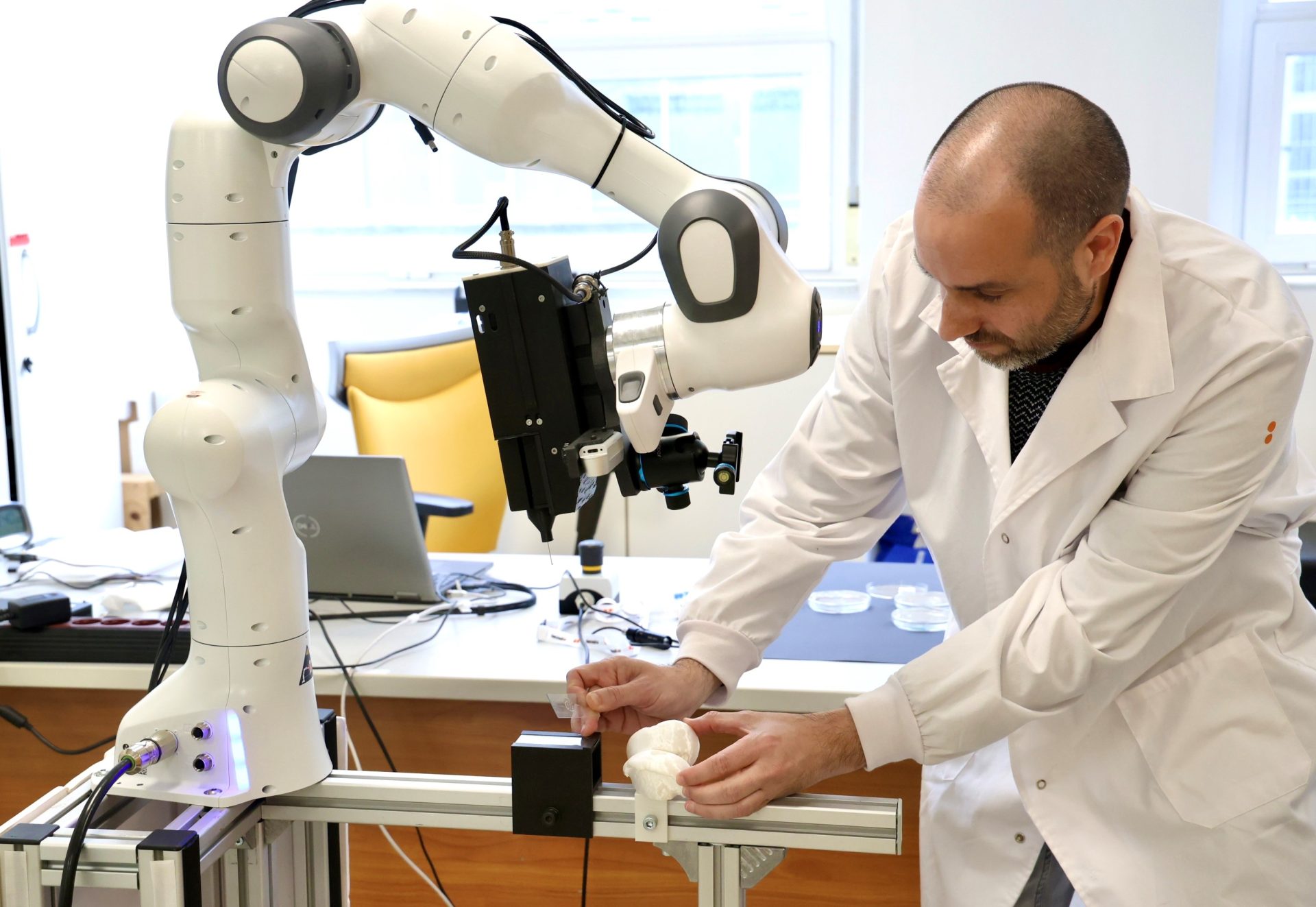TECNALIA promotes collaborative robotics in the healthcare sector to improve people’s quality of life
- The research and technological development centre has presented pioneering medical robotics technology to around 50 people from Basque and national companies to boost the competitiveness of the sector and offer solutions with a greater social impact
- The technology includes a robotic system for 3D bioprinting for cartilage implants, robotic systems for both stroke rehabilitation and to act as a third artificial limb, teleoperated robots to maximise surgical precision and a novel service to assess the use of exoskeletons as tool for health & safety at work
Donostia-San Sebastián, 23 February 2024. TECNALIA research and technological development centre has presented pioneering medical robotics technology to around 50 people from Basque and national companies, in order to boost the competitiveness of the sector and also offer solutions with a greater social impact by improving people’s quality of life.
The aim is to use technology to improve people’s health, and to this end, it develops technological solutions that provide companies with cutting-edge precision tools aimed at improving quality of life and health, through rehabilitation and prevention, among other things.
According to Andrea Sarasola, researcher and manager of TECNALIA’s Health projects, “robotics can resolve unresolved problems. Medical technologies are products, services or solutions that are used to improve people’s lives and health. The different forms of technology work with people, from prevention to diagnosis and treatment”. The challenge is to undertake developments so that robots can adapt to each company’s needs, and help them to be more competitive. In fact, some of these robots may be used not only in the healthcare sector, but also in industry.
The technology presented included a robotic system for 3D bioprinting for cartilage implants, robotic systems for both stroke rehabilitation and to act as a third artificial limb, teleoperated robots to maximise surgical precision and a novel service to assess the use of exoskeletons as tool for health & safety at work.
Robotised 3D bioprinting developed by TECNALIA
The robotic 3D bioprinting developed by TECNALIA creates cartilage implants directly in the patient during surgery, printing with bioink made of biological material that follows the same geometry of the bone defect and is also biocompatible with the patient, thus avoiding implant rejection. Models are now being printed in laboratories, and even implants that are then grafted into the patient during surgery.
During the conference, a robotic exoskeleton for stroke patient rehabilitation, based on biosignals, was also presented. This system links the patient’s intention to move, decoded through electrical signals from their brain and/or muscles. This is done with the movement of an exoskeleton attached to their paralysed arm, thus activating the neuroplasticity mechanisms by which humans are able to relearn a lost function after a stroke.
Companies also learnt about another robotic arm that works as a third artificial limb. In healthcare, it is a tool that surgeons could use to carry out tasks that require specialised synchronisation by handling three surgical instruments. It can also be used in other areas, for example to handle objects in industrial and handcraft environments, and even to control computers and mobile phones.
TECNALIA also presented a teleoperated robot, which repeats the movements made by the arms and hands of the person using joysticks. It can also receive the tactile sensation of clamping and force on the workpiece, thanks to the force sensors located on the robot’s grippers. There are commercial robots that are already being used in surgery to improve the surgeon’s precision and ergonomics in minimally invasive operations. They are also used in other sectors to handle hazardous materials or in environments that are potentially dangerous to humans.
Finally, the Medical Technologies team explained how assessments are carried out for the use of exoskeletons, adapted to the needs of people as a tool for health & safety at work. A first-of-its-kind assessment that measures the impact of the use of exoskeletons in the workplace and improves ergonomics. This technology is able to adapt to the needs of companies to improve health & safety at work.
About TECNALIA
TECNALIA is the largest applied research and technological development centre in Spain, a European benchmark and member of the Basque Research and Technology Alliance. TECNALIA works with companies and institutions to improve their competitiveness, people's quality of life and achieve sustainable growth, thanks to a team of more than 1,500 people committed to building a better world through technological research and innovation. This is why TECNALIA's research has a real impact on society and generates benefits in the form of quality of life and progress. Its main areas of action are: smart manufacturing, digital transformation, energy transition, sustainable mobility, health and food, urban ecosystem and circular economy.
In the latest brand awareness and positioning study carried out by the European Research Survey (ERS) in 2022, TECNALIA tops the list regarding R&D and Innovation brand awareness.

